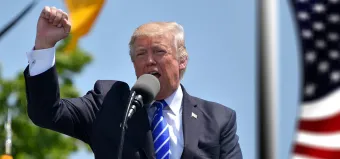Shooting oneself in the foot

Shooting oneself in the foot
Why the United States withdrawal from the Arms Trade Treaty is a mistake
President Donald Trump announced on 26 April 2019 that the United States would “unsign” the Arms Trade Treaty (ATT) signed in 2013 by the Obama administration. While ratification of the Treaty by the Trump administration was most unlikely, the signal sent to the world under the influence of the US gun lobby will no doubt be counter-productive to American interests and world security. Guns can also backfire and shoot oneself in the foot.
The Arms Trade Treaty (ATT) was initiated by civil society groups to mitigate the humanitarian suffering caused by the unregulated trade in conventional weapons worldwide, especially in conflict zones or in countries destabilised by terrorism and organised crime. It entered into force in December 2014 and now has 101 States Parties and 34 signatories (that included the United States), which signed but did not ratify the Treaty.
During the negotiation of that treaty, the Obama administration, aware of the rejection by the domestic gun lobby of any restriction on the right to bear arms, was at pains to limit the scope of its provisions to international trade and protect the national sovereign rights of states to regulate the internal conditions for sale and possession of firearms. The final version of the Treaty was made acceptable to the United States and this is why Secretary of State John Kerry could affix his signature on it, while stressing that the ATT “recognises the freedom of both individuals and states to obtain, possess, and use arms for legitimate purposes.”
What obligations does the ATT impose of its States Parties? Mostly the prohibition to export arms in violation of United Nations embargoes and other treaties, or for perpetrating serious crimes against international humanitarian or human rights law such as genocide, crimes against humanity or attacks against civilians. Additionally, all exporters are bound to assess the risk that the exported arms could be used to commit or facilitate serious violations of humanitarian or human rights law or acts of terrorism or organised crime; should such risk be ‘overriding’, the transfers would be prohibited.
By “revoking the effect of America’s signature,” President Trump obviously wanted to please the US gun lobby for electoral reasons. He also yielded to the hardliners in his administration who loathe international obligations or multilateral cooperation. The first precedent for such an ‘unsigning’ was the letter sent on 6 May 2002 to the UN Secretary-General by Ambassador John Bolton, then US Representative to the UN, informing the Depositary of the Rome Statute of the International Criminal Court, signed by the Clinton administration, that the United States “does not intend to become a party to the treaty” and thus “has no legal obligations arising from its signature.” Some legal experts have considered that the American Constitution did not give the President the power to “unsign” treaties unilaterally and that Congress should have a role to play to preserve the constitutional balance. Since President Trump was elected, his administration, mostly under John Bolton’s influence, decided to withdraw from several international agreements: the Paris Agreement on Climate Change (an executive agreement accepted by President Obama); the United Nations Education, Science and Culture Organization (UNESCO); the Trans-Pacific Partnership Agreement (TPP) and the Joint Comprehensive Plan of Action or ‘Iran Nuclear Deal’ (a political, not legally binding agreement).
In the case of the ATT, most critics underlined that the US national arms export control system was much more robust than what the Treaty required. As an American expert, Rachel Stohl, reminded, “the ATT helps level the playing field by requiring other countries to adopt standards similar to those that US companies must follow. While Russia and China have not joined the treaty, the ATT provides a principled basis for the United States and its allies to challenge these countries’ arms exports, where appropriate, as inconsistent with international norms.” When the US delegation no longer participates in the regular conferences and working groups of the ATT, it will lose the opportunity to shape and influence discussions and decisions while protecting its national interests.
Most perilously, the second “pillar” of the ATT, international cooperation in the fight against illicit trafficking in arms that fuels civil wars, harms civilians, and benefits violent armed groups or criminals will be weakened by the US withdrawal. How can the US Government legitimately accuse state or non-state actors of contributing to or taking advantage of this dangerous trade if it rejects the very norms of international behaviour that have been designed to combat such a scourge?
Marc Finaud is a former French diplomat who was seconded to the GCSP from 2004 to 2013 and is now a staff member. At the GCSP, Mr Finaud was leading activities related to Arms Proliferation.
